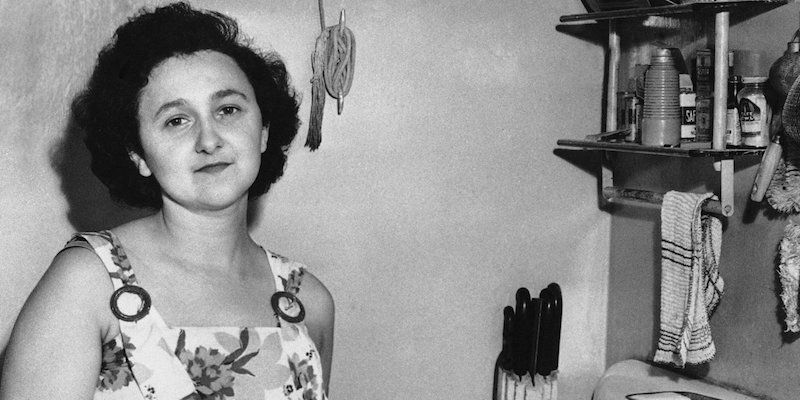A woman was honored by New York City Council members and Manhattan Borough President Gail Brewer on Monday, September 28th, on what would have been her 100th birthday. But she didn't make it to 40. She died at the young age of 37, in an electric chair in Sing Sing prison on June 19, 1953, minutes after her husband was electrocuted. Her sons--Robert, 6 and Michael, 10--were now orphans. Her name was Ethel.
While it appears true that Julius Rosenberg and David Greenglass had been involved in sharing information with the Soviet Union, the U.S. Ally during World War Two, Julius's role was much more minor than the government stated and it certainly did not deserve the death penalty. This isn't just a moral or ethical position, but a legal one. The Rosenbergs were indicted for "conspiracy to commit espionage," which doesn't carry a death sentence.
And even more egregious is the fact that Ethel was arrested and charged to pressure her husband into naming names. And the entire case against Ethel was based on the testimony of her brother David, who would later admit that he lied about his sister to protect his wife. Greenglass himself admitted this to journalist Sam Roberts in the 1990s:
I told them the story and left her [Ethel] out of it, right? But my wife put her in it. So what am I gonna do, call my wife a liar? My wife is my wife. I mean, I don't sleep with my sister, you know.
But what is more disturbing is the fact that the government was aware that they lacked sufficient evidence against Ethel. According to then FBI Director (and Martin Luther King-hater) J. Edgar Hoover, "There is no question... [that] if Julius Rosenberg would furnish details of his extensive espionage activities, it would be possible to proceed against other individuals. [P]roceeding against his wife might serve as a lever in this matter." In the same vain, Assistant U. S. Attorney Myles Lane told a Joint Congressional Committee on Atomic Energy,
The only thing that will break this man Rosenberg is the prospect of a death penalty or getting the chair, plus that if we can convict his wife too, and give her a sentence of 25 or 30 years, that combination may serve to make this fellow disgorge and give us the information on these other individuals. I can't guarantee that. But it is about the only thing you can use as a lever on these people. The case is not too strong against Mrs. Rosenberg. But for the purpose of acting as a deterrent, I think it is very important that she be convicted too, and given a stiff sentence.
The judge did just that. During his sentencing, Judge Irving Kaufman said,
I consider your crime worse than murder...I believe your conduct in putting into the hands of the Russians the A-bomb years before our best scientists predicted Russia would perfect the bomb has already caused, in my opinion, the communist aggression in Korea, with the resultant casualties exceeding 50,000, and who knows but that millions more of innocent people may pay the price of your treason.
Kaufman accused the Rosenbergs of atomic spying, even though they hadn't been charged with that. And opined that they were guilty of treason, even though the Soviet Union was an ally, not an enemy, when the Rosenbergs are said to have stolen the atomic secrets.
The Rosenberg's lawyers and supporters mobilized through appeals, fundraising, protests and letter writing. And they even got a stay one day before their execution. But it was overturned. And they were executed two years after they were convicted.
[caption id="attachment_728864" align="aligncenter" width="506"]
But their legacy lives on in their sons and even their grandchildren. Robert Meeropol (the brothers were adopted by Abel Meeropol, who wrote the lyrics and the music to Strange Fruit) founded the Rosenberg Fund for Children, which supports children of targeted activists in the U.S. Robert's daughter Jenn is now the executive director of the RFC. And Robert's daughter Rachel defends human, civil and constitutional rights as a lawyer at the Center for Constitutional Rights. Michael co-wrote We Are Your Sons, with Robert and edited the The Rosenberg Letters, a compilation of the correspondence between his imprisoned parents. His daughter Ivy made a documentary about the case, Heir to an Execution, which appeared on Sundance and HBO.
[caption id="attachment_728865" align="aligncenter" width="682"]
[caption id="attachment_729010" align="aligncenter" width="572"]
And on Monday, on what would have been Ethel's hundredth birthday, the children she had with Julius, and their grandchildren and a great-granddaughter, stood on the steps of City Hall in New York City where Council Members issued a proclamation to which "to honor the life and memory of Ethel Rosenberg," and where Manhattan Borough President, proclaimed the day the "Ethel Rosenberg Day of Justice in the Borough of Manhattan."
I spoke to Robert Meeropol about the significance of the event, his memories of his mother, her final letter to her sons (which makes me cry on live radio) and the legacy of his parents on my radio show. The interview starts at 15:00 and ends at 30:00.
And here is the segment with Robert Meeropol and an update from the event!
Leave a Comment
Related Post
